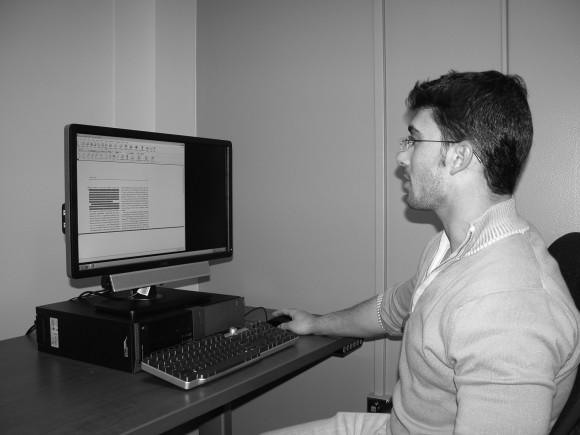By Susan Hayya, coordinator, Adaptive Technology and Services
In the last few years Penn State has tripled the enrollment for students who are blind or visually impaired. Adaptive Technology and Services (ATS) plays a major role in providing services for these students, as well as those with other disabilities. First, a student must go to the Office for Disability Services (ODS) where he or she is assigned a counselor, a disability specialist, who assists the student by identifying the appropriate accommodations. For example, the student could be granted extra time for exams and quizzes and be assigned a quiet place to take exams, a service sometimes provided by ATS. There is always a proctor assigned when a student takes exams away from the classroom and I have sometimes proctored exams. The student may also be approved to receive textbooks in an alternative format and that is where ATS joins in. Reformatting textbooks is a very big part of our work.
Most blind people use a program called JAWS, a screen reading program, to read aloud a book or a web page. While there is other similar software, JAWS is the most popular. JAWS can read different kinds of files, including PDFs and MS Word documents. ATS staff begins to prepare for reformatting by scanning books into a Word file then going through every page correcting spelling errors created by the Optical Character Recognition (OCR) program and moving page numbers from the bottom of the page to the top, a standard practice, to provide the reader a consistent orientation to the text. Footnotes are moved from the end of the book closer to where they are referenced so the reader does not have to go back and forth to find a footnote that appears in the beginning of the book.
ATS receives electronic copies of many textbooks, usually in PDF format, directly from publishers. There is a lot of clean-up to do with these PDF files. To make them readable through screen readers we perform several procedures, including tagging, adding paragraph and section headings, inserting alternative tags, which describe the pictures in the texts, then correcting the rea
ding order so that the screen reader does not read across columns or read the last paragraph first.
Professors often mount articles in ANGEL that they have scanned themselves including MS PowerPoints and Course Reserves material. This material can often be inaccessible to JAWS. This semester I am working with a blind student who is taking two courses in which a set of PowerPoints is assigned every week. The PowerPoints must be returned to the student as quickly as possible in order to stay in sync with the rest of the class. The slides are very graphic, full of non-relevant cartoon characters, and in an array of colors that diminish readability. The process to make them JAWS readable is first to save the presentation in text, remove all the bullets which are annoying to a JAWS user, strip the color, label each slide with a number, and explain all the relevant graphics. This week I did this for two 114 slide presentations.
Each semester I have access to many of our students’ courses on ANGEL. Often I work closely with the professors for each course to help them understand the challenges students have using JAWS and the other screen readers. For example, screen readers cannot read articles that are underlined or scanned at an angle. I encourage them to provide us with all their handouts, PowerPoints, and articles that the students will be using throughout the course early in the semester, so that we can prepare the material and have it ready when needed. I also explain that my office and the University’s Office for Disability Services are available to help them and their students.
ATS also has study rooms where students with disabilities can drop in or reserve a place to study alone or with friends, and have a place to take their exams. JAWS is available on two computers in ATS quiet study rooms.
This summer ATS will be assisting the University in hosting a summer camp program for high school students who are blind. For three weeks in July the students will be living the life of a college student, rooming in the dorms, taking courses, participating in a number of activities, and coming to the library to learn about online research and time management. We hope that as an outcome of this program more students who are blind will enroll at Penn State. I think that we will be successful and ATS is looking forward to assisting them.


